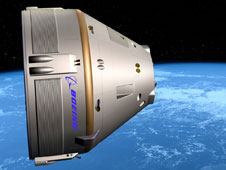
(PhysOrg.com) -- Research by Los Alamos scientists published today in the journal Nature documents significant progress in understanding the phenomenon of quantum-dot blinking. Their findings should enhance the ability of biologists to track single particles, enable technologists to create novel light-emitting diodes and single-photon sources, and boost efforts of energy researchers to develop new types of highly efficient solar cells.

Just as an expert chess player sacrifices a piece to protect the queen, the solar system may have given up a giant planet and spared the Earth, according to an article recently published in The Astrophysical Journal Letters.

(PhysOrg.com) -- Theoretical research by scientists with the U.S. Department of Energy (DOE)’s Lawrence Berkeley National Laboratory (Berkeley Lab) has led to record-breaking sunlight-to-electricity conversion efficiencies in solar cells. The researchers showed that, contrary to conventional scientific wisdom, the key to boosting solar cell efficiency is not absorbing more photons but emitting more photons.

Russia on Wednesday launches a probe for Mars that aims to collect a chunk of a Martian moon and become Moscow

This surprisingly powerful pulsar challenges existing theories about how these objects form.

For some time now nanocellulose has been at the focus of a good deal of industrial and scientific interest as a novel biomaterial. Potential applications range from the creation of new kinds of commercially useful materials and uses in medical technology all the way to the food and pharmaceutical industries. Swiss researchers have now developed a manufacturing process for nanocellulose powder, the raw material for creating polymer composites which can be used, for example, in lightweight structures for the car industry or as membrane and filter material for biomedicinal applications.

Researchers have developed a technology that combines the conventional fuel used in today

In a new article, researchers describe a way of creating thin, flexible sheets of organic light-emitting diodes (OLEDs) using a cheap, newspaper-style

Physicists around the world are hoping to witness a particularly spectacular characteristic in a few years

Researchers have developed the world

In an innovative agreement that will create new jobs, NASA today announced a partnership with Space Florida to occupy, use and modify facilities at Kennedy Space Center.

Scientists are building the world